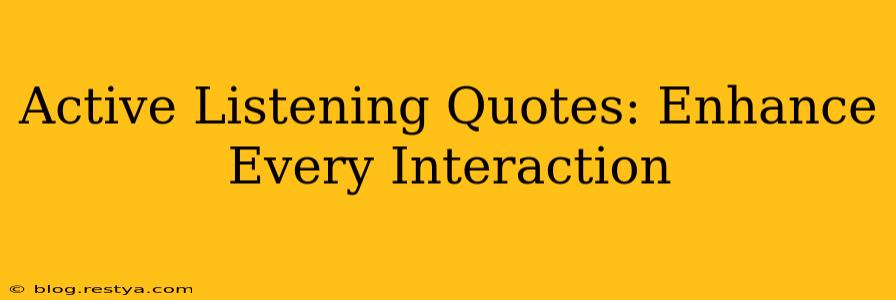In the bustling symphony of daily life, the ability to truly listen – to actively listen – stands out as a rare and precious skill. It’s more than just hearing words; it’s about understanding the emotions, the unspoken nuances, the complete message behind the spoken word. This ability to connect profoundly shapes our relationships, both personally and professionally. It fosters trust, strengthens bonds, and opens doors to deeper understanding. Let’s explore the power of active listening through insightful quotes and practical applications.
What is Active Listening?
Before we delve into the wisdom of quotes, let's define our subject. Active listening isn't passive hearing; it's a conscious and focused effort to understand not just the words being spoken, but also the speaker's feelings, intentions, and underlying meaning. It involves fully concentrating on the speaker, showing genuine interest, and providing feedback to ensure understanding. It's about being present, truly present, in the moment with the person speaking.
"The most basic of all human needs is the need to understand and be understood." - Ralph Nichols
This quote perfectly encapsulates the core of active listening. Understanding isn't just about grasping facts; it's about connecting on an emotional level, recognizing the speaker's perspective, and validating their experience. Being understood, in turn, fosters a sense of security and belonging, strengthening the connection between individuals. It's the foundation upon which meaningful relationships are built.
"Listening is a magnetic and creative force." - Frank Tyger
Tyger’s quote highlights the transformative power of active listening. When we truly listen, we create a space where the speaker feels heard and valued. This fosters openness and collaboration, unlocking creativity and innovation. Imagine the potential for breakthroughs in teamwork, conflict resolution, or even simple conversations when each participant practices active listening.
How to Practice Active Listening
Active listening isn’t an innate ability; it’s a skill honed through practice. Here are a few techniques:
-
Pay Attention: Eliminate distractions and focus entirely on the speaker. Maintain eye contact and show genuine interest through your body language.
-
Show that You’re Listening: Use verbal and nonverbal cues to indicate your engagement. Nod your head, offer brief affirmative comments like "uh-huh" or "I see," and summarize key points to ensure understanding.
-
Provide Feedback: Ask clarifying questions to ensure you grasp the speaker’s message fully. Reflect back what you’ve heard to demonstrate understanding and ensure accuracy.
-
Defer Judgment: Resist the urge to interrupt or offer unsolicited advice. Allow the speaker to express themselves fully before offering your perspective.
-
Respond Appropriately: After the speaker has finished, offer a thoughtful and relevant response. This might involve empathy, support, or simply acknowledging their feelings.
"The greatest gift you can give someone is your undivided attention." - Anonymous
This timeless quote underscores the profound impact of truly listening. When we give someone our undivided attention, we’re communicating that they are valued, respected, and important. This gesture is more powerful than any material gift.
What are the benefits of active listening?
This is a frequently asked question, and the answer is multifaceted. The benefits of active listening extend far beyond simply understanding what someone is saying. Here's a more detailed look:
-
Improved Relationships: Active listening fosters trust, strengthens bonds, and enhances communication in both personal and professional relationships. It shows respect for others and makes them feel valued.
-
Increased Empathy and Understanding: By paying close attention to verbal and nonverbal cues, active listeners can better understand the emotions and perspectives of others, leading to greater empathy and compassion.
-
Conflict Resolution: Active listening is a crucial tool in conflict resolution. It helps individuals understand different viewpoints, address underlying issues, and find mutually acceptable solutions.
-
Better Decision-Making: When we listen attentively to diverse perspectives, we gain a broader understanding of the issue at hand, leading to more informed and effective decisions.
-
Enhanced Productivity and Collaboration: In a team setting, active listening promotes collaboration, minimizes misunderstandings, and improves overall productivity.
-
Stronger Customer Relationships: In business, active listening is essential for building strong customer relationships. Understanding customer needs leads to better products and services.
In conclusion, the ability to actively listen is not merely a social grace; it's a fundamental skill for navigating the complexities of life, fostering strong connections, and achieving our goals. Embrace the power of truly listening, and unlock a world of richer relationships and greater understanding.

